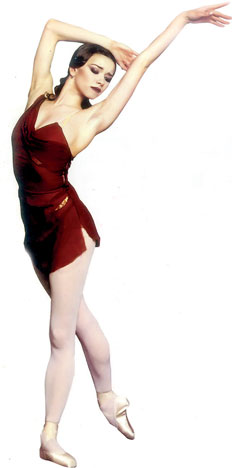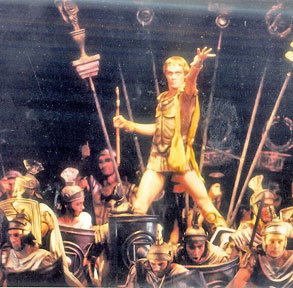Spartacus, the legendary hero
by Gwen Herat
The ballet is about the legendary hero, Spartacus who led the
rebellion of gladiators and slaves in Rome in the first century AD. The
popular version of the ballet has three acts, the scenes and nine
monologues. Originally known as Spartak, it had three acts and nine
scenes only. It was first produced in 1956 to the choreography of
Jacobson with the scores of Khatchraturian at the Kirov Theatre in
Leningrad.
|

Anna Antonicheva as Phrygia, wife to Spartacus ends up as a
widow when he is killed. Brilliantly danced in this Bolshoi
ballet. |
The story is about a slave, Spartacus and his wife, Phrygia who are
brought by the Roman General, Crassus to Rome. Spartacus incites his
fellow slaves to revolt against their oppressors but is eventually
killed by his enemies. The ballet was not successful and even less so in
Moisyev's production for the Moscow Bloshoi Ballet in Moscow. However,
Grigorovich staged a powerful production in 1968 for the Bolshoi Ballet
with Vassiliev, Maximova, Liepa and Timofeyeva.
This was debuted in London in 1969. Other versions were premiered in
1957 by Blazex in Prague, Sergi did his version in 1969 at Budapest and
Labis in 1977 at Charlero.
It was Yury Grigorovich who had danced in the Yakobson version and
who was to realise all the power and drama implicit in Nikolai
Khachaturian's scores when he produced his version for the Bolshoi
version. It had been a massive undertaking but he had been in the
company for four years and produced successful productions such as The
Stone Flower, The Sleeping Beauty and the Nutcracker. The new Spartacus
was showered with much acclaim for the grandeur of its scale and the
vast sweep of the male dancing in it, especially Vladimir Vasiliev as
the first unforgettable Spartacus.
This was topped with the imaginative force of the monologues in which
the leading characters exposed their innermost feelings.
Bolshoi style
The strength of the troupe, the grand horizons of its aspirations and
the attainment that caught up with the audiences with excitement and
tragic resonance of the ballet, Spartacus epitomised the Bolshoi style
that emerged under the great Grigorovich's artistic directions.
Act. 1, Scene I Invasion: Peace is disrupted by the legions of the
Roman Empire led by the cruel, perfidious Crassus. The prisoners he has
captured are doomed to slavery. Among them is Spartacus, their prize
captive. His monologue presents him as a proud, courageous captive who
refuses to be reconciled to slavery. Scene II: The slaves are driven to
the market place and men and women are separated by force. Phrygia is
parted from Spartacus who protests at the inhumanity of the Romans.
Gladiators
He fights for his rights to be with his wife but the odds are against
him and they are separated. Her monologue mourns for her lost happiness
and as a slave, dreads what is ahead for her.Scene III: Crassus is
attracted to Phrygia and to distract from it, Aegina involves him in
frenzied merry-making. When the orgy is at its height, Crassus orders
two gladiators to fight blind-folded unto death. The victor is
Spartacus. His monologue is that he has inadvertently become a murderer,
killing one of his fellow-men. He makes a bid for freedom.Scene IV:
Spartacus incites the gladiators to revolt by breaking free their
chains. They all flee Rome.
Act II, Scene I: The Gladiators are joined by people who are united
in their dream of liberty and equality and by their hatred of oppression
Spartacus is declared their leader in their quest for freedom. His
monologue is the goal for freedom but his happiness lies in his love for
Phrygia. Scene II: Expressing their love for each other after meeting,
the couple vows never to be separated and they hide. A procession of
wealthy patricians make their way to Crassus's palace and although she
is not of nobility, Aegina is among them.
|

A defiant Crassus, Mark Peretokin leads his army against the
gladiators in Spartacus |
Her monologue is the determination to gain power over Crassus and to
win him and thereby gain entrance to the world of patricians. Scene III:
Crassus is celebrating his victories and the patricians extol him.
Spartacus's army surrounds his palace and Crassus is forced to flee
which makes Spartacus's monologue joyful at victory with the assurance
that the gladiators will soon win their freedom.
Capture
Scene IV: Crassus is captured by the gladiators and Spartacus
challenges him for a single-handed combat. He is no match for the
gladiator who gets the upper hand. Crassus is doomed to death but they
have sympathy for Spartacus and release him because he is not bent on
revenge and is convinced that the gladiators will gain freedom.
Act III Scene I: But Aegina is not happy at what happened and sets up
Crassus against the rebels. She is determined that the gladiators must
die. She convinces Crassus that he can defeat them with his legionaries
and he sets off to the battlefield. So, Aegina's monologue is that of a
treacherous woman who would help them to be defeated.
Presentiment
Scene II: As Crassus and his army are advancing, Spartacus is forced
to take up arms and many of his captains reveal themselves to be cowards
and desert him leaving Spartacus and Phrygia shattered in their dreams
of being united. Spartacus's monologue has a presentiment that the
forthcoming battle will prove fatal to him. However, he knows that death
in battle is preferable to a life of captivity. Phrygia senses his
frustration but is helpless.
Scene III: Aegina finds her way into the ranks of the cowardly
gladiators and offers them wine and whores. They succumb to temptation
and later, Aegina delivers them into the hands of Crassus's men. Crassus
who is consumed by the need of revenge because of his humiliation at the
hands of Spartacus is determined that he must die.Scene IV: The
legionnaires are surrounded by Spartacus's forces but the gladiators are
killed in the battle. Spartacus too dies a hero's death.
Epilogue Requiem: The sad Phrygia finds the body of her beloved
Spartacus and is heart-broken. She is convinced of his bravery and love
for the gladiators, will bring him immortality. |


